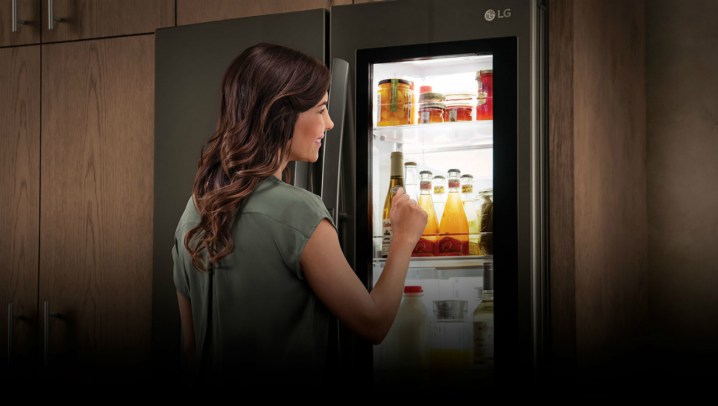From ovens you can preheat using your voice to fridges that let you see what’s inside while you’re out shopping, smart appliances offer extra perks. But are these features worth it? Have smart appliances evolved to the point where they’re worth the extra cash?
What exactly is a smart appliance?

Smart appliances take things a step further, beyond just basic functionality. Your fridge can do more than just keep your food cool, and your oven can do more than simply cook your meals. Smart appliances attempt to be more efficient and self-sufficient, communicating via the internet, communicating with other internet-connected devices like Alexa, and diagnosing errors or problems.
App control and voice-control allow the user to operate the appliance remotely, while programmatic efficiency upgrades (like automatic water and cycle adjustments in washing machines) allow for less input on the part of the user.
Benefits of smart appliances

One of the biggest benefits of owning a smart appliance is the convenience factor. You can simply say “Alexa, preheat the oven,” when you have your hands full. You can use your phone to check how much longer the dryer will take to dry your clothes, check the contents of your fridge, or start vacuuming your floors with a robot vacuum.
Many appliances diagnose themselves when there’s a malfunction, which can be immensely helpful. Efficiency is another benefit. Most smart appliances in 2019 tend to be both energy efficient and efficient in terms of their operation. The owner can conserve water and electricity while also washing and drying their clothes and dishes faster. Smart appliances used for cooking, like sous vide machines, pressure cookers, and ovens, often come with recipe apps that can help you cook your meals.
Lastly, there’s the cool factor. The ability to say “OK Google,” and control your appliances can be an impressive conversation starter for guests who visit your home.
Drawbacks of smart appliances

When smart appliances first hit the scene, most people were awestruck and a bit perplexed. “Wow! A fridge that can connect the the internet.”
But after some time passed and we saw smart gadgets like Google Home acting as a translator, we realized these smart appliances were just appliances with a few extra features. We became a bit less enamored with connected appliances, and wondered “What else can they do?”
Many of the drawbacks of smart appliances center around their limitations and their cost. Some of the features in smart appliances simply aren’t practical (at least not yet), so the extra cost of such features may not be worth it for price conscious customers.
A good example of this is the smart washer and dryer. You can start a smart washer and dryer remotely, but you still have to go to the washing machine to load your dirty clothes into it anyway, so why not start the machine while you’re standing there? You still have to transfer the clothes from the washer to the dryer, and the dryer still can’t fold the clothes for you. Plus, is it worth it to pay for Wi-Fi connectivity features on a washing machine when many non-smart washers offer similar efficiency features (energy efficiency and quick-cycle features)?
Should you buy smart appliances in 2019?

This depends on the type of appliance, the price, and individual preferences. When deciding whether or not to purchase smart appliances, each individual must make their own assessment the value versus cost of smart appliance features.
With some smart appliances, the value is clear. For instance, a smart oven (like a Whirlpool Smart Oven Range) and a smart fridge (like the LG InstaView French Door Fridge) can both be very helpful because the smart features are useful and practical. However, with washers, dryers, and dishwashers, you might not want to pay too much added cost for smarts because you might not have much use for the current available connected features.
For smaller appliance and robot vacuums, smart is often the way to go. Once you’ve had a robot vacuum you can control with your voice, there’s really no going back.
What does the future look like for smart appliances?
According to data published by Juniper Research, the cost of smart appliances is expected to decline by 52% between 2018 and 2023. We can also expect to see the smart features we now consider premium to start to become the norm, and the cost for those features will level out.
We’re starting to see this happen right now. We’re already seeing a decline in prices of robot vacuums with features like visual mapping and Wi-Fi connectivity, and we’re already seeing more and more washing machines with sensors that can automatically set the water temperature and cycle based on the load. Smart appliances will likely continue to offer more features at lower prices, and we may also start to see more practical features (perhaps even dryers that can fold clothing). In the coming years, more products may also come out that can add smart features to existing, non-smart appliances.


